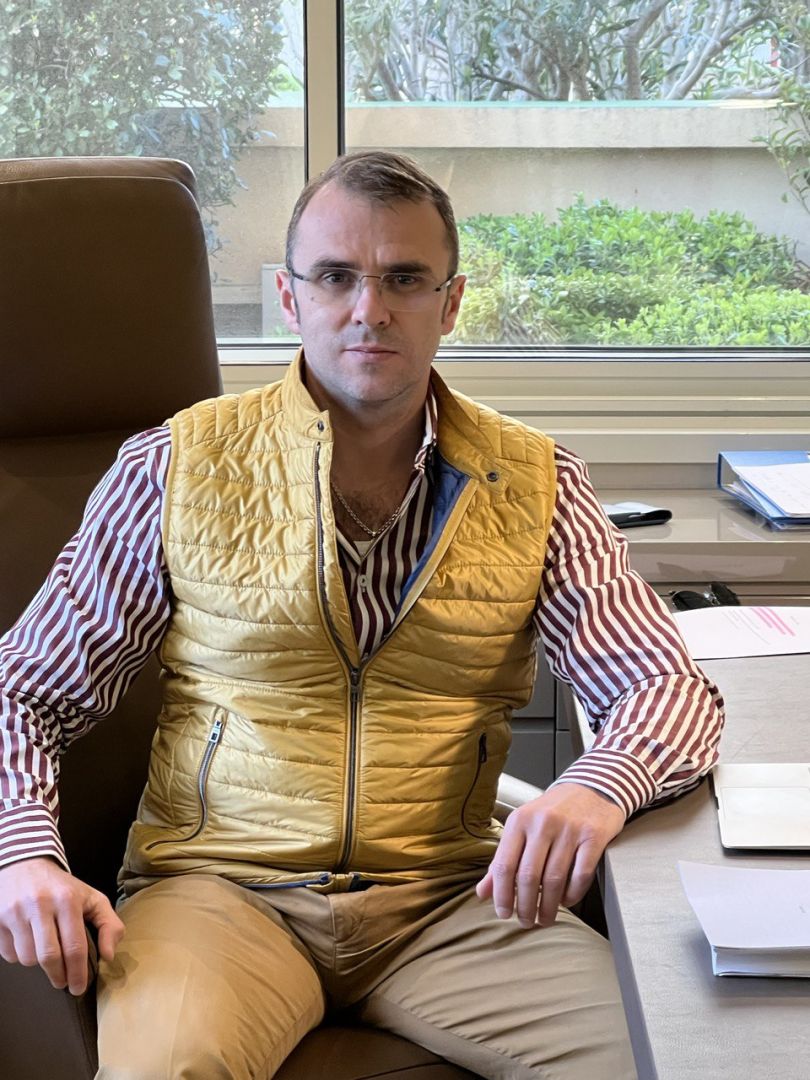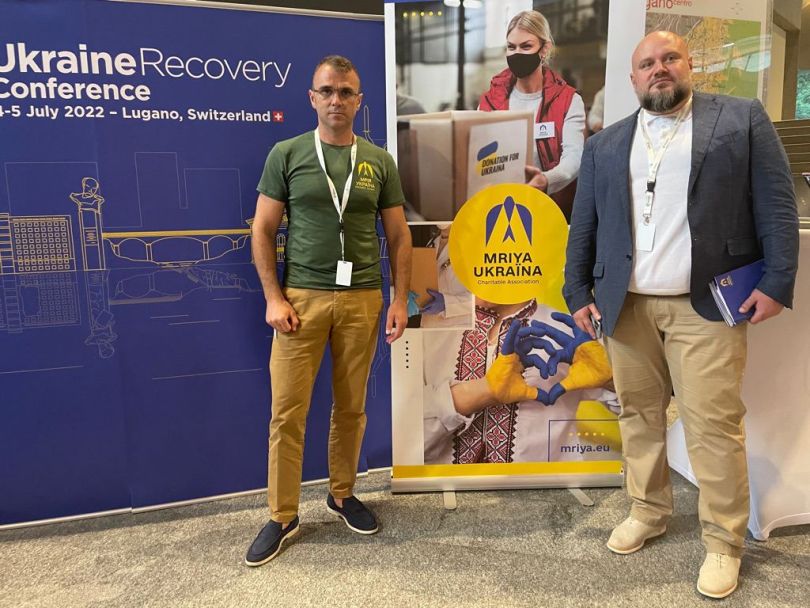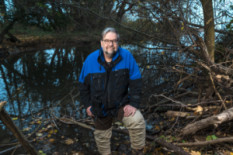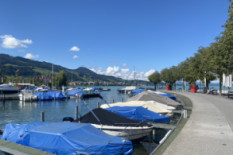
Iurie Moraru
- Master of Law, University of Geneva, Switzerland
- Independent Financial Expert
- Vice President, Joint Chamber of Commerce (JCC)
- Chairman, Charitable Association Mriya Ukraina
Iurie, you have been living in Switzerland for a long time. How did you feel on February 24, 2022, when you learned that war had started in Ukraine? What was your initial reaction?
I am originally from Moldova and a citizen of that country. However, I have a solid connection to Ukraine. I have Ukrainian roots and many business partners, friends, and relatives there. I have visited Ukraine frequently and feel very close to the country. When the war began, it was an absolute shock, a feeling of disbelief about how such a thing could happen. After a brief shock, I realized that something needed to be done. I understood that, on my level as an individual with my civic position, I had to help my friends and acquaintances at the very least, and if possible, Ukrainians in general. I started calling my acquaintances and friends in Ukraine, talking to them, finding out how they were doing, and coping with everything. A crucial conversation for me was with my friend and partner, Dmytro. We quickly realized that we had the opportunity to "do something." At that point, I said, "Do something," because we didn't know how to help. Dmytro began to find out in Ukraine who needed what. I also started reaching out to my contacts (both professional and student networks) in Switzerland to see how I could contribute to helping Ukraine at my level.
What did you manage to find out at that time? What kind of help did Ukraine need the most?
I discovered that there were already people in Switzerland involved in humanitarian aid efforts. They were collecting clothing (winter clothes and everything necessary for survival) and food (canned goods, flour-based products). Some were providing medical assistance by purchasing medicines and related supplies. However, organizing the transportation of all these items from Switzerland to Ukraine in the early days and weeks of the war proved very challenging. Most transportation companies that agreed to provide such services delivered the aid only to the Ukrainian border with Poland, Hungary, or Romania. It wasn't easy to pass everything further into Ukraine. That's when I found one truck driver with a large truck who agreed to go directly to Lviv. Somehow, I became a "transport person." I organized one or two trucks per week during March and April. There were a lot of trucks. We helped to send aid from other charitable organizations in Switzerland as well. We worked closely with the Ukrainian Embassy in Switzerland (in Bern). They rented a warehouse for us in Bern, and I would meet with the embassy representative there several times a month.

Were you only involved in transportation in the first weeks of the war, or were there other directions?
Transportation was one part of my activities. The second part was related to an initiative by my partner and friend, Dima. He discovered a great need for certain medications (everything related to the war). He inquired about their needs from various medical institutions and clinics, sent me the lists, and I searched in Switzerland, where we could quickly purchase them. That's how I got acquainted with the manager of a pharmacy in Zurich, who was not indifferent to the fate of Ukrainians and helped us acquire the necessary medicines. We bought the medications from him at a reasonable price. He managed to find everything we needed. So, based on the lists we received from Ukraine, we bought, packed, and sent everything to Lviv. In addition to the driver who was constantly involved in transportation, there was another transportation company that made 2-3 trips to the Ukrainian border, and there was also a private entrepreneur from Switzerland who made 3-4 trips. The first time he went there because his girlfriend was from Ukraine, and he was taking her back home.
Then there was a need to structure your activities to make everything official. What decision did you make?
Yes, initially, everything was without any structure. I, Iurie Moraru, and my friends, my partners in Switzerland and Ukraine, decided to "do something" this way. Gradually, our actions became more stable. At some point, we realized that we needed a formal structure. We already had the content of our activities, but we needed to reach as large an audience as possible, so to speak, to raise more funds. As a lawyer, I understood that a charitable association had to be created. Many people talk about a foundation, but that is an entirely different and more complex structure than a charitable association. So, I quickly started the process of creating it. On April 1, 2022, we registered the charitable association "Mriya Ukraine" in Switzerland. I am its founder and chairman. Besides me, I have a colleague in Switzerland who helps me. And in Ukraine, we had a team at that time. Dmytro (Kyiv, Kremenchuk) was actively involved in the work, his niece Anastasia provided all possible assistance with great enthusiasm, and Maxim controlled and coordinated the distribution of medications and aid across different regions of Ukraine. Later, he also searched for vehicles, especially in Germany.
In "Mriya," there was another direction: we bought vehicles in Germany and sent them to different cities, towns, and communities in Ukraine. These were not military but small vehicles that local doctors and others needed. That began the "Mriya Ukraine" association and our activities.
Why did you devote all your efforts to supporting Ukraine? Why was it so important to you?
It was vital to me. Firstly, my country, the Republic of Moldova, also suffered and continues to suffer from the war - there have been severe threats to its security. As the president of my country, Maia Sandu, said, "The Republic of Moldova is actually protected by the 'Ukrainian shield.'" As a citizen of Moldova and Romania - meaning a citizen of the EU - I should do something to support my people. And also as a sign of gratitude.
Secondly, in the context of the war against Ukraine, there is a confrontation between two different visions of society. I live in Europe, in a developed country, and I like this way of life. I see that there is a threat, and there is a country and a people who defend this way of life. That is why we must do something and not just sit idly by. I won't say everyone should do it - everyone has their opinion. But I am confident that I am doing the right thing.
Thirdly, because I love Ukraine! I have many friends in Ukraine, and I often visit there. And when they are in danger, I can't say, "Figure it out yourselves, and when everything is fine, give me a call, and we'll have a glass of champagne together." That's not who I am.
I want to add that many other people around me engage in the same activities as me. There was an understanding that now is the moment to act. Otherwise, it will be too late. It's a historical moment. And when the war is over, all of us abroad will have to account for it - a historical account, so to speak. There will be questions like, "What did you do? Where were you?" Maybe it's selfish, but I don't want a vast debt there. I want to "pay my dues." That's briefly about the motives behind why I'm doing this. There may be other arguments, but let's not delve into them. Maybe it's also because I have Ukrainian roots, through which I, to some extent, identify myself with Ukrainians and Ukraine. We have a lot of mutual influence. Historically, many Moldovans and Romanians (one nation) live in northern Ukraine, Bukovina. And the same goes for the southern part of Moldova. So we have a lot in common.

What changes have occurred in Switzerland and Europe regarding Ukraine? Are there global processes taking place? What do you think about these changes?
There are several observations I would like to make on this matter. In my opinion, Switzerland has undergone certain transformations. For the first time in history, Switzerland changed its approach to neutrality and joined sanctions against Russia. This has never happened to such an extent before. It indicates that something is changing. Switzerland has realized that remaining neutral and conducting business "as usual" as before the war is no longer possible. For most of Switzerland, the Swiss people and the political class have realized that neutrality alone is unsuitable. Overall, the Swiss people have a strong sympathy for Ukraine and Ukrainians. Of course, there are differing opinions as well. But overall, the people are helping. The religious community of the municipality of Bern in the canton of Thurgau, "Evangelische Kirchgemeinde Berg," often reached out to the association "Mriya Ukraine." People assisted and donated money to this religious community. They approached us and said, "Here, we have collected several boxes of medication," or "Here, we have collected 3-4-5 thousand francs. We want to help Ukraine." Together, we bought the necessary items and sent them. This happened regularly. These were ordinary people in a village in Switzerland. They sympathized with Ukraine and Ukrainians and wanted to help. There are many examples like this.
Unfortunately, many people in Switzerland and Europe only learned about Ukraine after the start of the war. Ukrainian refugees consist primarily of women and children, as men stay in the country to defend their homeland and care for matters there. We should show sympathy and support to these refugees because they seek protection and flee from hardship. The initiative and activity of women from Ukraine are very impressive. They immediately start doing something useful when they come to Switzerland or other countries. I haven't seen Ukrainian female refugees say, "I have assistance from the government, and that's enough for me."
On the contrary, I often hear them say, "Why do I need this assistance from the government when I can engage in something, develop myself, and do something useful?" I have seen many similar cases in Switzerland, France and other countries. As an example, we collaborate with Yana Pavlova, from Kharkiv, who is the initiator, cofounder and Chairwoman of the charitable association "Free Ukraine Global", in Switzerland. Together with them, we sent medical aid shipments to Kharkiv. There is another project and a very generous sponsor who, upon hearing about this initiative that resonated with him, expressed a desire to help Ukrainian girls from "Free Ukraine Global." He will provide a certain amount of money, and we can continue. You, women, have great potential to influence European society, and your impact will undoubtedly remain. After the war, many will return home. However, the connections and contacts you create in Europe, particularly Switzerland, will endure. Your Ukrainian footprint will remain!
Did "Mriya Ukraina" only help Ukrainians? Were there other people who needed your assistance?
I want to note that at the beginning of the war, in March, "Mriya Ukraina" provided humanitarian aid and medication not only to Ukrainians in Ukraine but also to Ukrainian refugees in Moldova. Moldova is an impoverished country. At the start of the war, it took in many refugees (the number of refugees was higher than in Poland per 1,000 Moldovan citizens because the country is small and has a small population). Even before the war, I worked in a charity organization in Moldova, where we assisted underprivileged families and orphans. But when the war began, my partners in Moldova shifted their focus to helping refugees: meeting them at the border, providing food, shelter, and everything necessary. There was a case when they initially evacuated a children's home - around 30 children. They were brought from the Odessa region to Moldova and accommodated in an abandoned boarding school without heating (and it was winter - early spring, so it was cold). They urgently needed assistance with radiators and warm clothing.
We organized a collection of aid on Facebook, and everyone shared the information with their contacts. It was such a wave of enthusiasm and helped that I was shocked but in a positive way! One Sunday in Zurich, in a post-industrial complex, we were given free parking space for three hours to gather and load items for shipment. A bus arrived that operated between Moldova and Switzerland (Chisinau-Zurich-Geneva). It was empty and heading back. We thought the bus was big and everything would fit inside. But no. What people brought as aid was enough to fill three buses with a trailer. We didn't know what to do. And people kept coming. We realized that we couldn't accept any more. Luckily, our friends and partners also involved in this assistance had a warehouse near Zurich. So we directed people who arrived there, and they would take care of collecting and helping transport all these items to the warehouse. Self-organization began. The result was good - we sent three buses. I hope it was helpful and made a difference for someone.







